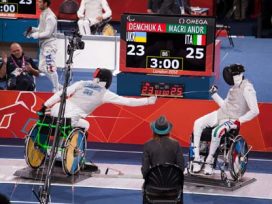Esprit: How did you find out about the history of the West Indies? Did people in your family talk about slavery?
Lilian Thuram: No, they didn’t talk about it, not at home and not at school. When I left the West Indies and arrived in mainland France I discovered all the negative connotations that went with being black. So, at school, the first time anyone spoke about “blacks” was in the context of slavery and the slave trade. And yet Africa does have a history that predates that trading triangle… I gradually came to understand the extent to which the “idea of race” has left its mark on French and European history.
If you want to understand the tensions, lack of understanding, racism and discrimination in French society today, you have to take account of the weight of the past; you have to bear in mind this heritage of prejudice and racial theories.
I am West Indian and so I’m very aware of the history of slavery. I try to be informed about this subject. It’s strange that, in mainland France, people often act as though slavery was just a matter for West Indians or for blacks, as though it had nothing to do with the history of France.
But if we fail to acknowledge the history of France we cannot understand what is happening today. For example, the classification of races drawn up by Gobineau dates from the mid-nineteenth century, and that is not so long ago; indeed it’s really quite recent. In his Essay on the inequality of human races, the “blacks” are held to be inferior. Whether people remember this or not, this idea of inferiority – and he is not the only one to have promulgated such a theory in Europe – has left its mark on French society and still continues to be used to justify discriminatory attitudes. Young West Indians whose families have always been French can’t get over the fact that they are treated in that way in their own country. Mainland France seems to have concluded that the matter is closed, that it’s all ancient history.
Esprit: But in the West Indies, the heritage of slavery is very present. It is an unconscious presence. It is what Patrick Chamoiseau has called “mémoire obscure”.
LT: In order to understand what is unconscious you have to improve education. But that assumes that you are prepared to accept a more complex view of the history of France: you have to remember that Napoleon was also the one who restored slavery to the colonies. The “greatness” of France has another side: colonization, slavery, the slave trade.
But I am convinced that most people are people of good will, always provided that things are explained to them.
Esprit: A change in the official line and in the school syllabus, is that what you would consider important?
LT: That has to be the basis because it emanates from the centres of power. Such discourse must take us away from the logic of a hierarchy of races that we’ve inherited and that is still to be found today, even if it is often unconscious. For example, we mustn’t hide behind the word “discrimination”. As far as I’m concerned, discrimination – in employment or in housing – is racist behaviour and that’s all there is to it. Until Rosa Parks, blacks in the US were not allowed at the front of a bus; if you’re prepared to be angry on hearing that, then you should also be angry when you know that today a person can find it more difficult to find a job or somewhere to live because that person is “black”. Society ought not to accept that.
Ignorance probably has a lot do with it. Some people don’t realize how far-reaching discriminatory behaviour can be: they have not experienced it themselves or no one has mentioned it to them. I understand how such lack of understanding can arise but we cannot just leave things as they are. People sometimes ask me why I talk about slavery: “It was such a long time ago.” But no, that’s the point: the slave-owning mentality is still there, even after four generations. My great-grandfather’s father was born a slave and in terms of family history, that’s still very close. On the scale of the history of humanity it’s only yesterday. You can’t behave as if the injustice that they suffered never happened.
Esprit: You’ll have heard of what’s called the “Confiant Affair”, after the writer from Martinique who wrote a violently anti-Jewish text. Given that Raphael Confiant is also a militant in the cause of remembering slavery, how do you feel about the fact that this kind of statement came from a milieu in which people are challenging the denial of slavery? Do you find that upsetting?
LT: I have to say that it doesn’t upset me. Unfortunately, when you’re trying to get your voice heard and you’re not in the habit of being listened to, you can sometimes take a wrong turning. You tell yourself that there’s too much talk of the extermination of the Jews and not enough of slavery. This is a very short and dangerous path to take. Moreover, there are others who dispute that slavery is a crime against humanity. Slavery and the Holocaust are part of history. They are undeniable facts and I can’t understand how anyone can deny the seriousness of either. What is serious is that these things should be said by people who ought to be educating society. That leads to confrontation and demeans everyone.
Why place one memory in opposition to the other? It’s the same idea that we’re dealing with: the superiority of one race over another, the fact of doing what you wish to other people. As soon as you cast doubt on the humanity of others and consider them as sub-human, then you are applying the same logic.
We shouldn’t allow ourselves to be dragged into a cultural confrontation. France has a fundamental role to play here. The population of France is very mixed and if we don’t react intelligently in order to create national cohesion based on well-established principles then we will allow ourselves too to be dragged into a clash of cultures. If we feel obliged to pass on this history it is so that we may learn to live together better.
Esprit: Is it against that background then that we should understand what you meant when you said: “I’m not black, I’m French”?
LT: I was replying to a politician who was criticizing the number of “blacks” in the national football team. I was just reminding him that the selection criterion is not whether you are “white” or “black” but whether you are “French” and that we are French, even if he seemed to have some doubts about that. A painter that I’m fond of, Chéri Samba, painted a picture with a caption that says: “I am a painter. I have never seen a white man; I have never seen a black man.”
Esprit: But don’t you think that your claim might have upset some of your West Indian “fellow-countrymen” a bit, in that they would rather have heard you say “I’m Guadeloupian”? Might not some of them have seen your claim as a way of distancing yourself from your Guadeloupian identity in favour of your French identity?
LT: I don’t worry about these matters of identity. Being enclosed in an identity is restricting. Identity is only a good thing if it is a force that opens you up to others.
Esprit: Some people would reply that, when you are called a “negro”, you have to have some kind of identity to hang on to.
LT: No, that’s the point; if you play that sort of game then you play into the hands of the racists. I sometimes talk about the “whites” in order to get people to understand the absurdity of all that. Why subscribe to these categories, why think and speak the language of the racists?
Esprit: You wrote a preface for the novel Banlieue noire, by Thomté Ryam, which tells the story of a young footballer from the banlieue who messes up the possibility of getting out through sport. You wrote that “That could have been my own story” and also: “There will never really be a Republic until the best dribbler in the street can also one day become an engineer, or the boss of a company or a trade-union official and everyone thinks it’s perfectly normal.” You use sport to talk about all these problems and there are not that many sportsmen who do so. How is it possible, on the basis of sport, on the basis of the French national team, to get all that sort of thing moving?
LT: What’s interesting about sport is that it has always been ahead of the game. Integration through sport is nothing new. In the US it was black athletes who were the first to be recognized as Americans. In France too.
We’re in the process of giving birth to something. But giving birth is always painful. And what will be born? Things can’t go backwards, people are suffocating. Previously, those who suffered discrimination used to say nothing, because they couldn’t see how it worked. They accepted what they had, and thought they were lucky. But young people born in France who feel completely French want to have a share in everything. Are we going to tell them that they are wrong to make demands, to tell them that they cannot have the same dreams or the same hopes? They are demanding the same rights.
And I think that this is a good thing for France. Discrimination means neglecting people who have a contribution to make. An intelligent approach would want everyone to be involved. But are we going to start thinking this way before it’s too late?
What is happening in France is fundamental for Europe. After the riots in 2005, many people in Europe said: “The French model of integration has had it; we mustn’t do what they have been doing.” Even though we’re more advanced. I’m lucky enough to be able to travel and I can see that France is light-years ahead of some countries. It’s incredible. That’s what I felt in Italy and today in Spain, for example.
Esprit: So you’re standing up for the French model of integration?
LT: Yes. My friends are first and foremost French and, what’s more, they don’t even understand the kind of thing that people say about this. For example, why speak about “first, second, or third generation”? They’re French. Why speak about minorities? Do the others see themselves in terms of a majority?
But – to get back to history – you would think from the way that some people’s minds work that the population of France became fixed sometime way back in the past. In reality, even in the past it was not fixed. Nevertheless, it is only since the 1970s that people of different origins have really been living together. In mainland France it was long thought that slavery and colonization were justified by a “racial hierarchy”. The whole culture, the whole of society was characterized by this way of thinking. And today we’re asking all those people to live together and to believe that everyone is on the same level. But they haven’t been taught to accept that, because the ideas of racial inferiority and superiority have never been challenged. The French population itself was not directly linked to the institution of slavery. But the state sanctioned, organized, and took advantage of slavery and the slave trade. Slavery is not just about colour: it is a system in which some people had interests and which the state controlled and assisted.
Esprit: Doesn’t it complicate things a bit that part of the slave trade was African and that, to put it another way, it was blacks selling blacks?
LT: That’s why you have to leave aside the question of colour in order to see the system that was set up. What I can’t understand is why the state, after such a long time, cannot manage to deal with this subject calmly.
Esprit: Perhaps it is because it is not just a matter of ignorance. It isn’t only because people don’t know but also because there are forces, there are interests that come into play.
LT: I once found out that there was an auction of archives on the slave trade. I wanted to buy these documents and I discovered that descendants of the West Indian slavers, creoles, were trying to get hold of these archives in order to hide or destroy them. There are people who know perfectly well where their fortune comes from and they don’t want anyone to find out.
It’s a difficult question: there are very few people in our society who really know what slavery was like. And, when you forget this bit of history, you’re forgetting an entire struggle.
In the West Indies, if people thought really carefully about the history of slavery and the role of the state, a lot of things would change.
Esprit: We would like to go back for a moment to situating the things that we’ve been talking about in relation to your own experience, in particular as a professional footballer. In the world of football there are many people like you, people who have had a similar career, a similar life story – let’s think about the very West Indian and, going beyond that, very “black” and Arab make-up of the French national team. Do you speak with your fellow players about what we’ve been discussing, or more precisely, about shared initiatives that could bring you together on one point or another, or does each go his own way?
LT: Let’s say that there are ideas that follow the same route because we’ve had the same career, experienced the same problems and, above all, we know what life is really like! After all, we weren’t born footballers! But it’s also a matter of sensitivity. It’s a delicate subject because, as soon as you are in the public eye, you have to be careful what you say. I have to confess that I don’t try to achieve unanimity. I say what I have to say on the subject because I think that this can help people to understand each other better.
Because we’re footballers, young people do listen to us and we can get them to understand that sometimes, out of ignorance, we don’t look at each other in the way that we should. We don’t meet each other, get to know each other and, in the end, we don’t learn to respect each other.
In general, what’s good about football is that we meet people from different cultures who all have different points of view, different prejudices, and we come to realize that you have to be open in order to accept the other person. We’re learning to live together, to get to know each other and to respect each other.
Esprit: Sport is also a language. You said in one interview that football is “the language of happiness”. It’s an exchange. It makes contact between people possible because it’s also universal.
LT: Football can do that. During a match – and I see this amongst the supporters as well – people’s minds work differently. OK, football does make them switch off a bit as well…
Esprit: Does the fact that there is a large number of West Indians in the French national football team affect the way it works?
LT: I was touched by the fact that the French team went to play a friendly in Martinique. I thought it was important for the people who had lost loved ones in the plane crash in 2005. [On 24 August 2005, 160 people, among them 152 French Martiniquans, died in a plane crash in Venezuela – ed.] It was the first time we’d played in the West Indies and it was a powerful gesture to make. Because the West Indies do support the French team, contrary to what people say. That day I organized a meeting with Aimé Césaire so that the players could get to know the man.
But, apart from that, I don’t think you can see any influence on the game and the mindset because our careers have been different. Many of the players were born in the Paris area whereas I was born in Anse-Bertrand in Guadeloupe. The message that we’re getting is that we should “succeed through sport”. Very often, top-rank sportsmen come from underprivileged social groups and, since there are lots of blacks in such groups, their strong representation in the national team is easy to explain. In previous generations, that’s what happened with the Italians and the Poles. The choice of football also results from the fact that, until recently, people also used to say that blacks were not suited to certain sports: “They’re not made for swimming or for golf…” When are they going to stop casting doubt on our abilities?
Esprit: When you think about your future after sport, do you see yourself still playing a part in the social field as you do as a sports star?
LT: What I would like would be, after football, to be able to talk to people about all these matters and to work at getting them to understand each other better. If it is necessary to talk about this long history throughout which “blacks” have been thought of as inferiors, it is not in order to provoke confrontation but to defend equality.
That’s why I think it is fundamental – and I’ve been able to find this out through my own experience – that a young black person or a young North African should not assume the role of a victim. What matters is to learn to look at yourself in a different way.
When we’re discussing racism, friends often say to me: “Yes, but even so, things are a lot better than they used to be!” What does that mean? What does that “even so” mean?
Interviewed on 19 December 2006 in Barcelona.







